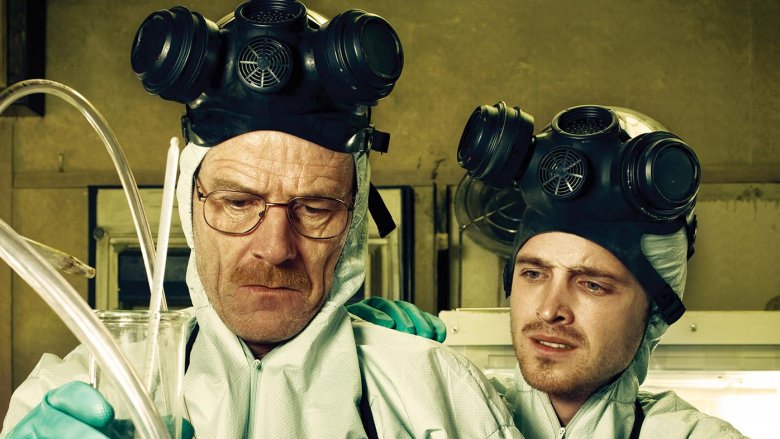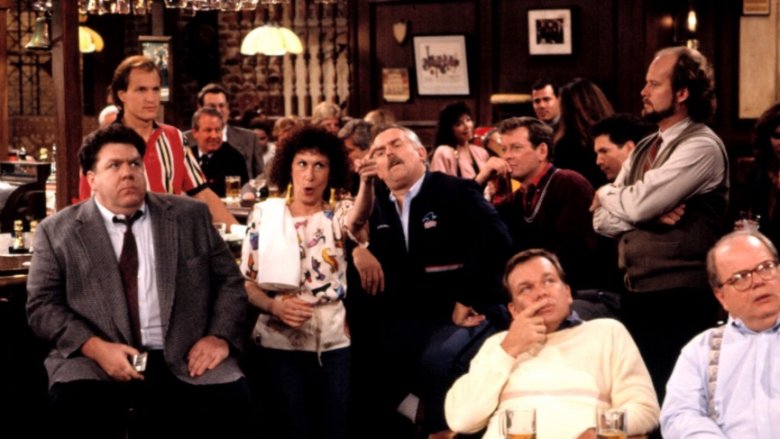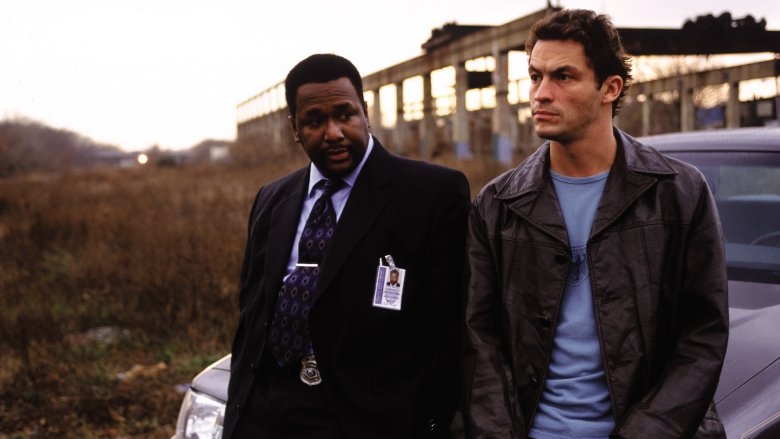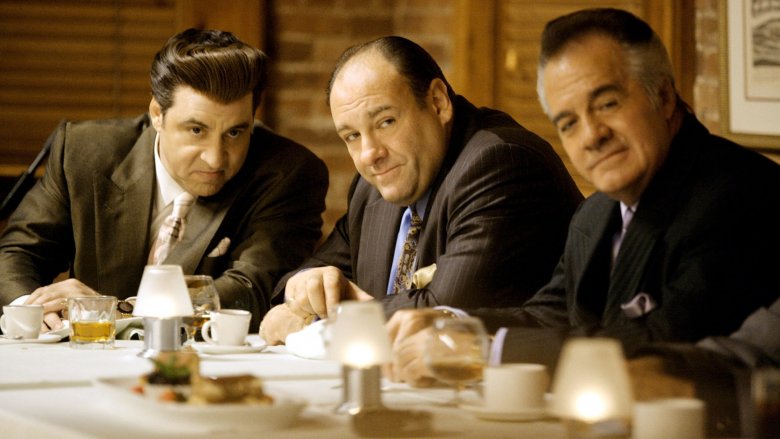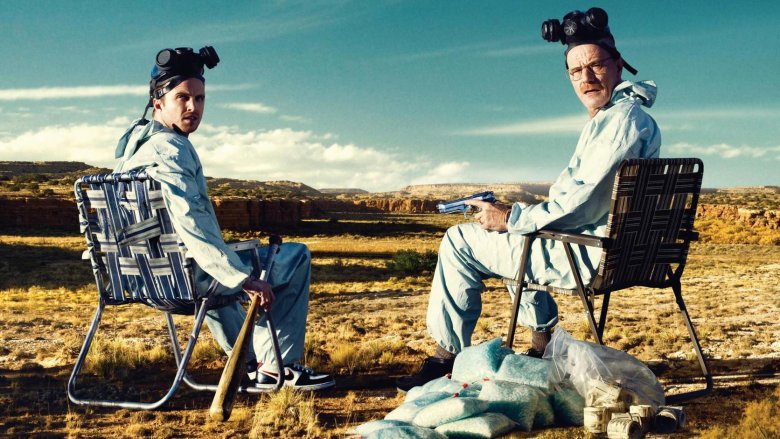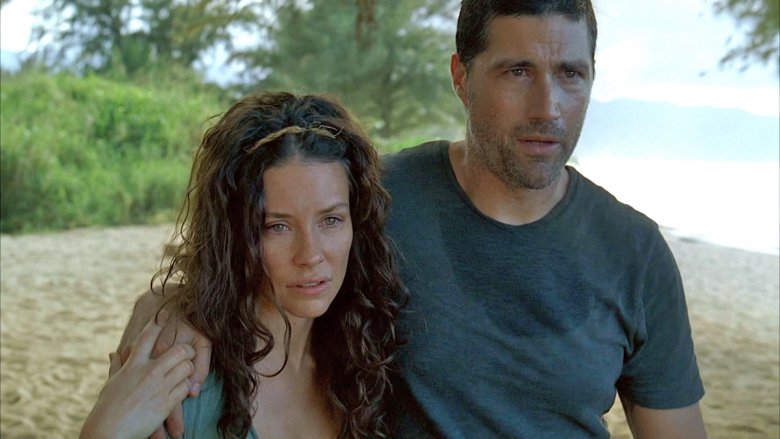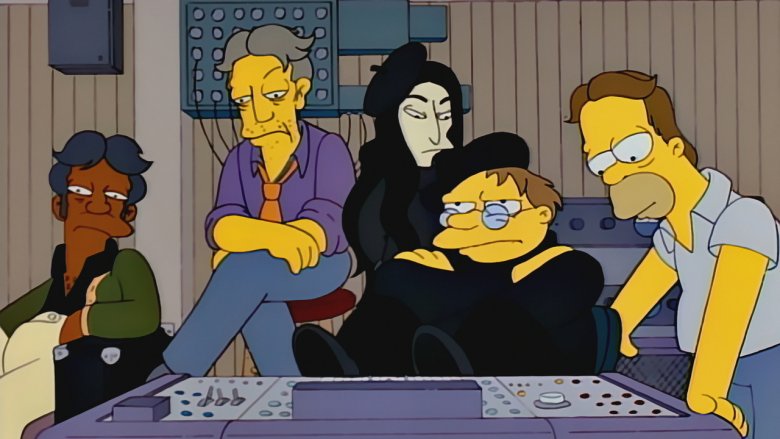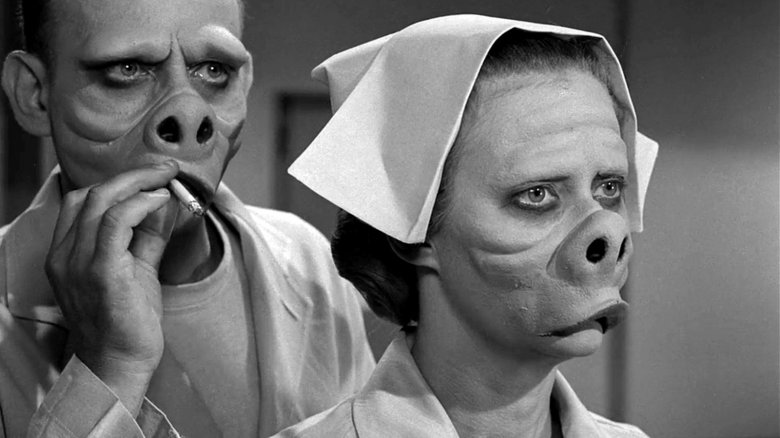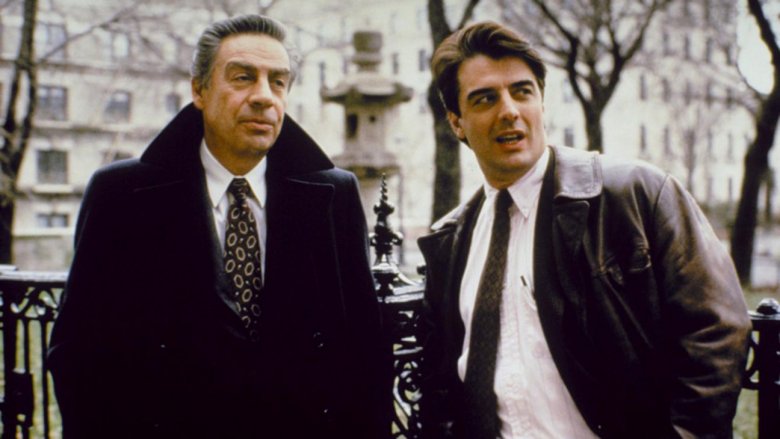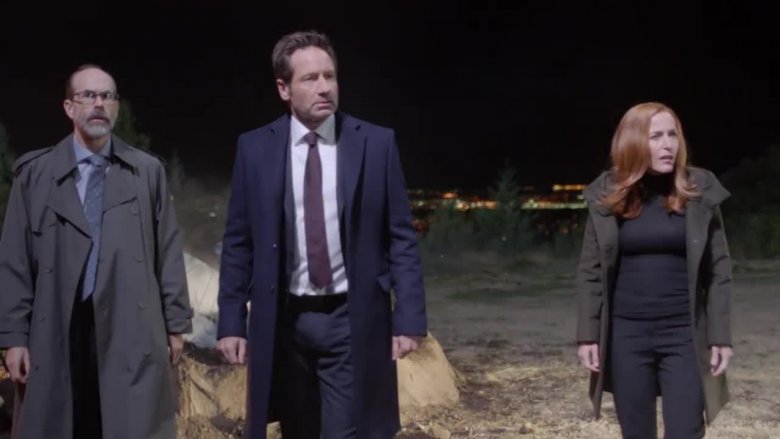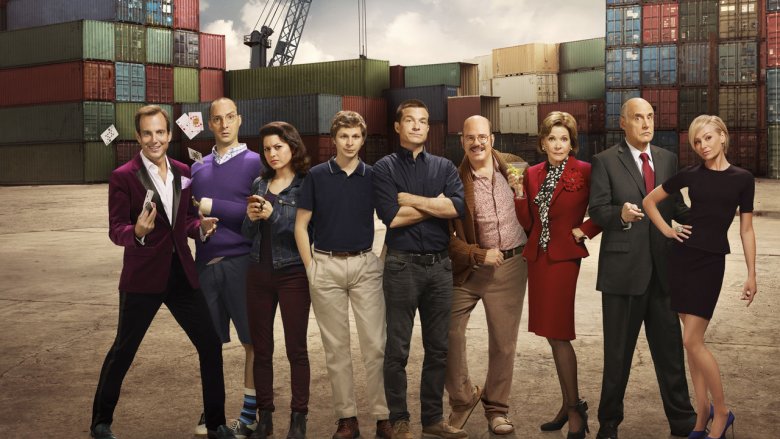The Most Perfect TV Shows Ever Made
Ranking television shows has been a popular pastime for just about as long as we've had TV, but as much fun as it can be to argue over the best of the boob tube, there's rarely an objective way to truly determine which series deserve to be on top. Between the hundreds of different people involved to a show's production and marketing, on top of the thousands of factors involved in the show itself, it's a miracle that any television show ever gets made at all. When a show is good, it's easy to smooth over the tiny flaws in the story or moments of weak acting, but when everything goes just right, some shows come together like an alchemic reaction to make sheer viewing gold. All of which is to say that your list is probably different — and ours might well be tomorrow — but for the moment, these are our picks for the most perfect TV shows ever made.
Cheers
Sometimes, you want to go where everybody knows your name. It's a feeling we're all familiar with, but it was truly immortalized by Gary Portnoy's classic theme song for Cheers.This long-running hit NBC sitcom revitalized what was seen as a fading genre, catapulting its stellar ensemble cast into television history along the way. Cheers is a simple concept stripped to the bone of any weakness — and all that's left are some of the most charming characters (and character actors) ever assembled on one set with gut-bustingly funny scripts and a sneakily compassionate heart.
Ted Danson gets the lion's share of credit for his ridiculously good comedic delivery as skirt-chasing ex-pitcher Sam Malone, but everyone from Rhea Perlman to Shelly Long played their characters so skillfully that they feel as familiar as your own family. But even beyond the obvious comedic prowess of the cast, Cheers endures because it's fundamentally about finding belonging and companionship, and being truly grateful for that opportunity. As much as the show could be funny, there was real compassion in how the characters treated each other, making it impossible for the audience to resist growing to love them. There are very few modern comedies that haven't been at least somewhat influenced by this juggernaut, and for good reason. Even today, it's hard not to choke up a bit when Sam turns off the lights and says goodbye to the bar in the final moments of the show.
The Wire
What can we say about The Wire that hundreds of television critics haven't already said? We could talk about the powerfully written characters, the way the show synthesized history and fiction like the best of Tolstoy, or just list the many many actors who have gone on to great work following the show. It's no exaggeration to say that The Wire revolutionized television, taking the realistic setting and stripped down style of David Simon's previous show Homicide: Life on the Street and cranking up the scope to awe-inspiring degrees.
Considering how much modern television is inspired by the long-term plotting and interconnected characters of this show, it can be tempting to look at The Wire as an obvious success story. But looking at it from a purely modern perspective ignores how brilliantly it was able to explore and dramatize the intersectionality of crime, the ways in which social strata, through corruption or incompetence, consistently lets down youth of color, funneling them towards predetermined roles. That kind of subject matter alone should throw The Wire in contention for TV history's most perfect shows, but it was also incredibly entertaining with sharp dialogue and gonzo performances. You know a show's impressive when it can convey an entire scene through the use of one NSFW word.
The Sopranos
It's fitting that just as The Godfather is rightly considered one of the greatest movies of all time, so is The Sopranos one of the most perfect television shows ever made. It all comes down to the mafia in the end. In the case of The Sopranos, it had the benefit of a leading man in James Gandolfini who was so undeniably magnetic and talented that even his three Emmy Awards seem insufficient. Beyond that, the show's sharp writing, wide cast of characters, and beautiful cinematography opened audiences' eyes to the potential of television as an artistic medium.
In The Sopranos, moments were allowed to breathe, characters were allowed to evolve and fail realistically, and the fiction felt realistic in a way that fiction rarely gets the chance to be. Without The Sopranos, the Golden Age of Television arguably would never have happened. It's no wonder that it landed at number one in Rolling Stone's 100 greatest tv shows of all time.
Breaking Bad
Breaking Bad had one of the all-time greatest high concepts that a dramatic series has ever started from — "What if Mr. Chips became Scarface?" — with a lead actor whose raw charisma could make the show a cultural phenomenon. But more than that, the show was a visual feast, with cinematography that would rival high-budget movies, a soundtrack that continually reinvented itself, and a writing staff so good that nearly every character had a sympathetic arc and rich background. In other words, the show broke the mold for television quality.
Even if you were a fan of Bryan Cranston from his underrated performances in Malcolm in the Middle or The X-Files, you couldn't possibly be prepared for how intensely he would play cancer-ridden Walt White in Breaking Bad. He was famously so good at drawing the viewer's attention and sympathy that creator Vince Gilligan himself was surprised at how much the audience still identified with the meth-cooking super criminal near the end of the show. He really shouldn't have been; when a show is as compelling as Breaking Bad, it's hard not to feel addicted.
Lost
When it comes to science fiction, it's easy to let the high concept and flashy visuals carry the story, but that can sometimes come at the expense of character building — and with it, the audience's emotional attachment to the story as a whole. Lost never had that problem. While the concept and plotting of the show were razor sharp, fans tuned in every week to watch the characters they'd grown to love and learn more about them. In fact, by writing each episode to take place partly in a different time (sometimes in flashbacks, sometimes in flash-forwards) for a different character every episode, Lost was able to ground its outlandish science fiction setting in very real and very relatable character dramas.
The show's style hit a nerve with audiences and arguably changed the way modern television was written. Through all the polar bears and smoke monsters, the real perfection of Lost lay in how much it made you care about these broken, flawed characters who had to band together to survive.
The Simpsons
It's difficult for a TV series to stay consistently good for a single season, let alone for almost 30 years, but The Simpsons has somehow managed it. Uproariously funny and effortlessly innovative, the show is equally beloved by comedy nerds and regular fans, with thousands of jokes that have built the bedrock of modern popular culture. It isn't just the endlessly quotable dialogue, or the fact that The Simpsons predicted almost everything in our modern age, or even that the show's success arguably paved the way for adult animation to thrive as a genre. At its core, The Simpsons is a perfect show because its characters are so richly developed that anything else in the world can be used for a joke.
Need a joke about Johnny Cash as a spirit guide in a drug trip? No problem. Need a joke about a literal Bond villain? Easy. Any bit of surrealism or fictionality can be incorporated into a show when the characters stay true to themselves and you've got animators to draw it, lending The Simpsons a flexible longevity that other shows still struggle to match.
The Twilight Zone
Some shows become so built into the fabric of popular culture that it's hard to look at them objectively; they become too loaded with symbolic weight to actually be entertaining and too influential for later works to be as surprising to modern viewers. The Twilight Zone does not have that problem. While plenty of its more famous episodes are parodied and referenced, that does nothing to take away from the creative dynamo that was The Twilight Zone. From its stark black-and-white cinematography to the masterful acting, the show served (and continues to serve) as a peerless example of artistry in television.
That's without even talking about the scripts, pulled from some of the best and brightest writers in America, and usually adapted with a peerless eye by the inimitable Rod Serling. The Twilight Zone was able to tackle social issues like racism, poverty, and the horrors of war through gripping allegories and timeless characters. There's a reason it's often held up as the gold standard for anthology storytelling.
Law & Order
You don't often see procedurals on lists of best shows ever, which is a bit baffling. It's not at all easy to continually hold the viewer's attention for years in the face of actor replacements and structurally identical episodes. With all that in mind — and for numerous other reasons — Law & Order absolutely deserves its status as one of the gold standards for procedurals. The show's high concept combined a police show (the "Law" part of the title) with a lawyer show (the "Order" part) allowing for two great tastes that go great together, allowing for a greater emphasis on the realistic journey from criminal to suspect to criminal defendant in a court of law.
While every Law & Order fan has their favorite detective, the show's emphasis on plotting and ripped-from-the-headlines crimes allowed it to stay fresh for a full 20 years — long enough to land it on a list of some of the longest-running television shows of all time. Who are we to argue against the obvious staying power of Dick Wolf's most famous creation? Plus, if nothing else, the theme song absolutely deserves to be immortalized in the television hall of fame.
The X-Files
Sometimes a perfect television show needs everyone, from the writers to the directors to the actors, operating at peak efficiency for years; other times, all a perfect show needs is two actors whose relentless charisma and chemistry catapults the show into the hearts of millions.
The X-Files falls squarely into the latter category. This isn't to take anything away from the incredible assemblage of behind-the-scenes talent the show boasted over the course of its lengthy run — it's just that no matter what else happened to be going on, the core appeal of The X-Files always came down to the interplay between Gillian Anderson's skeptic Dana Scully and David Duchovny's dedicated Fox Mulder. With two leads as charismatic and well-matched as Scully and Mulder, the show could delve deep into conspiracy theories, outlandish monsters, and larger questions about faith in a rapidly technological era, giving the show a much-needed flexibility. It's a testament to Anderson and Duchovny's incredible chemistry that The X-Files spun off a pair of big-screen features — and ended up returning to the airwaves in 2016, a full 15 years after its original incarnation ended.
Arrested Development
There are a few beloved comedies on this list, but none of them were as unjustly short-lived as Arrested Development. Following a formerly rich family's stumble into hilarious public disgrace — and their equally side-splitting constant inter-personal scheming — Development packed more jokes into every episode than most shows had in their entire run. Each scene added new wrinkles to the Bluths' scams and lies, continually setting up later plots and subverting viewer's expectations. The show was packed to the brim with meta-textual nods to actors' former roles, while Ron Howard's narration served as both a much-needed reminder of past events and a vehicle for comedy in its own right — eventually becoming social media shorthand for times when a sadly clueless individual assuredly states something that's obviously not true.
Although the show inexplicably failed to find a mainstream audience during its three-season run on Fox, its razor-sharp wit attracted mountains of critical acclaim — not to mention a rabid cult audience that helped make the series one of Netflix's first forays into original content when it bankrolled a belated fourth season in 2013, seven years after it was canceled. Four years later, the streaming service confirmed that season 5 was officially in the works. Plenty of subsequent comedies have been inspired by Arrested Development, but one of the best things about the show is that its humor remains truly unique, utilizing an all-star cast to their fullest in a series that was truly perfect.
